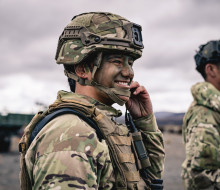
Keeping skills alive in transfer to Reserve Force
05 July 2024
Unfortunately you are viewing this website on an outdated browser which does not support the necessary features for us to provide an adequate experience. Please switch to a modern browser such as latest version of Google Chrome, Mozilla Firefox, Apple Safari or Microsoft Edge.
Ngā mihi nui
Royal New Zealand Air Force (RNZAF) engineering officer Flight Lieutenant Donté Kelly (Tūhoe) has received more than the Master of Science in Aerospace Vehicle Design (MSc AVD) he worked for last year at an English university.
Royal New Zealand Air Force (RNZAF) engineering officer Flight Lieutenant Donté Kelly (Tūhoe) has received more than the Master of Science in Aerospace Vehicle Design (MSc AVD) he worked for last year at an English university.
At a special awards ceremony after the main graduation at Cranfield University in Bedfordshire on Thursday (UK time), his outstanding results on the course were recognised by two top awards: the Joe Young Memorial Award for Best Overall Student (for achieving the highest overall academic grades); and the Course Director’s Prize for the Best Individual Research Project Thesis, awarded to the highest graded thesis.
His thesis researched methods and developed toolsets to enhance the RNZAF’s structural repair design and analysis capability.
Flight Lieutenant Kelly is from Ruātoki, inland from Whakatane, and is a fifth-generation Defence serviceman, going back to his great-great-grandfather, who served in the First World War with the First Māori Contingent. Koroua on both sides served in 28 (Maori) Battalion in the Second World War.
“Growing up we knew our koro were returned servicemen - on Mum’s side was a Navy veteran, and my other koroua served in B Company, 28 (Maori) Battalion,” he said.
“Both were humble, quiet and unassuming men. They influenced my decision to serve in different ways – their advice and stories taught me about the Services and the mana of serving your people.
“My engineering career also started from childhood, using my hands early on with fixing things on the farm. Then my father started me on lawnmowers, stepping up to rebuilding the quad bikes and then on to the farm trucks and tractors.”
He enlisted in 2006 as an aircraft technician and has gone from strength to strength ever since, including completing officer training and gaining a place in the highly competitive RNZAF Engineering Master’s Scheme.
The MSc AVD course is a year of fulltime study for civilian and military students from the UK, Europe, and other Commonwealth countries. It is designed to produce qualified aircraft design engineers who can work in the various avionics, aircraft systems, or structures specialist arenas.
Flight Lieutenant Kelly said the course was intense, diverse and incredibly valuable.
Master’s level study ensured that RNZAF engineering capability maintains suitably qualified and experienced personnel to deliver specialist engineering knowledge and skills for military air operations. This had become more relevant as the organisation moved into the new Defence Aviation Rules framework, he said.
In addition to developing aircraft design analysis experience, RNZAF engineers developed an understanding of initial aircraft design criteria and how operational envelopes, structural and system performance limitations could be used to guide repairs and design changes.
Flight Lieutenant Kelly also got the opportunity to travel a little, including a visit to Forli War Cemetery in Italy where his great-uncle is buried after being killed in action at Trieste.
“As Forli is so far away from Ruātoki, apart from his brother (my koro), the whānau haven’t been able to pay their respects,” he said.
As Deputy Maintenance Flight Commander of No. 6 Squadron at RNZAF Base Auckland, Flight Lieutenant Kelly is looking forward to continuing to develop as a structures and mechanical engineer, using his newly gained knowledge and skills.
“The Air Force has provided me with an incredible opportunity to build a career in my chosen field, but my path is just one of those that the Defence Force offers. There are many valuable opportunities for professional development - in academic, technical or cultural programmes.”